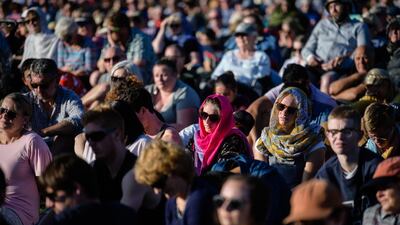Thousands gathered in New Zealand’s cities yesterday to protest against racism and remember the 50 Muslims killed by a gunman in Christchurch.
About 15,000 people turned out for a vigil in Christchurch in a park near the Al Noor Mosque, where a white supremacist killed more than 40 of the victims. Several more people were killed at the nearby Linwood Islamic Centre.
Many non-Muslim women wore headscarves at the vigil, some made by members of Christchurch’s Muslim community, to show their support for those of the Islamic faith.
Prime Minister Jacinda Ardern announced a national remembrance service would be held on Friday to honour the victims, most of whom were migrants or refugees.
“The service will be a chance to once again show that New Zealanders are compassionate, inclusive and diverse, and that we will protect those values,” Ms Ardern said.
The prime minister has been praised for her leadership since the attack. She swiftly denounced the incident as terrorism, tightened gun laws and expressed solidarity with the victims and their families.
The vigil started with an Islamic prayer, followed by a reading of the names of the victims, including pupils from the nearby Cashmere High School.
“Darkness cannot drive out darkness, only light can,” Okirano Tilaia, one of the school’s pupils, told the crowd. “Hatred cannot drive out hatred, only love can.”
Earlier in the day more than 1,000 people marched in a rally against racism in central Auckland, carrying “Migrant lives matter” and “Refugees welcome here” placards.
Muslims account for just over 1 per cent of New Zealand’s 4.8 million population, a 2013 census showed. Most of the country’s Muslims were born overseas.
As New Zealand continued to mourn and ask questions about how such an attack could have happened in the peaceful South Pacific nation, the victims’ families spoke about their losses.
Shahadat Hossain, whose brother Mojammel Haque was killed in the attack, arrived in New Zealand on Saturday to take his brother’s body back to Bangladesh.
“I can’t describe how I felt when I saw my brother’s lifeless body,” he told Reuters. “I was devastated.”
Farid Ahmed, who was at the Al Noor Mosque when the shooting took place, escaped but his wife, Husna, was killed. Yesterday he went door to door, thanking his neighbours for their support.
“They came running ... they were crying, they were in tears,” he said of his neighbours when they found out that Husna had died.
“That was a wonderful support and expression of love, and I am feeling that I should also take the opportunity to say to them that I also love them.”

